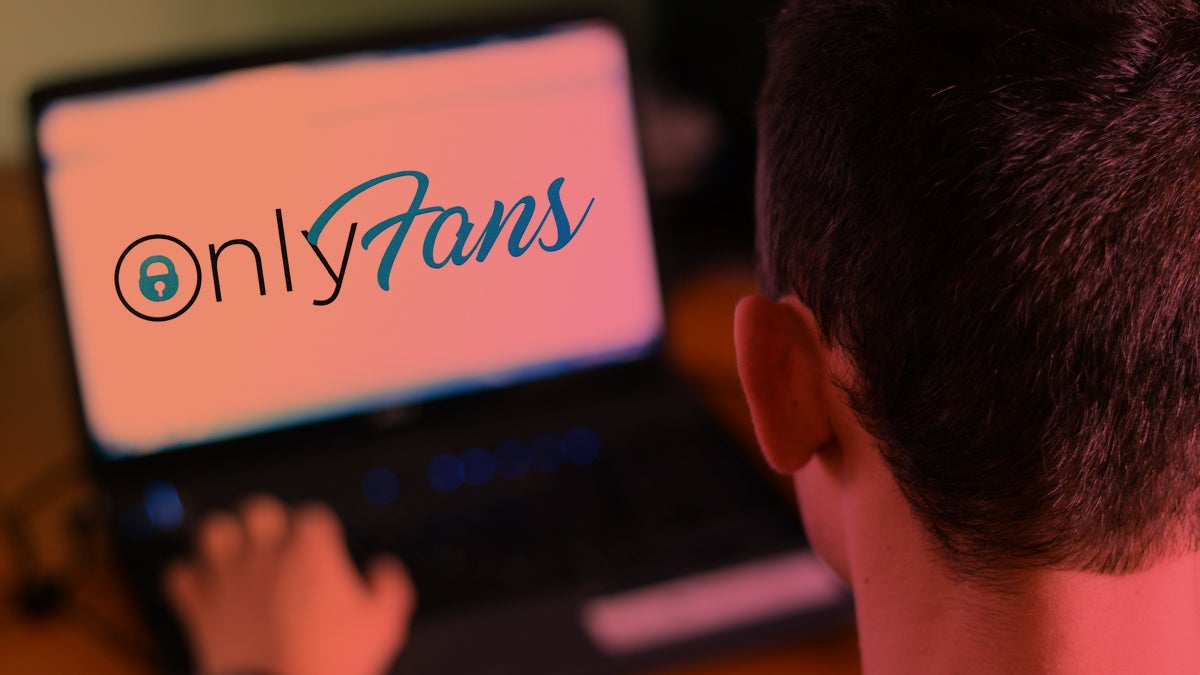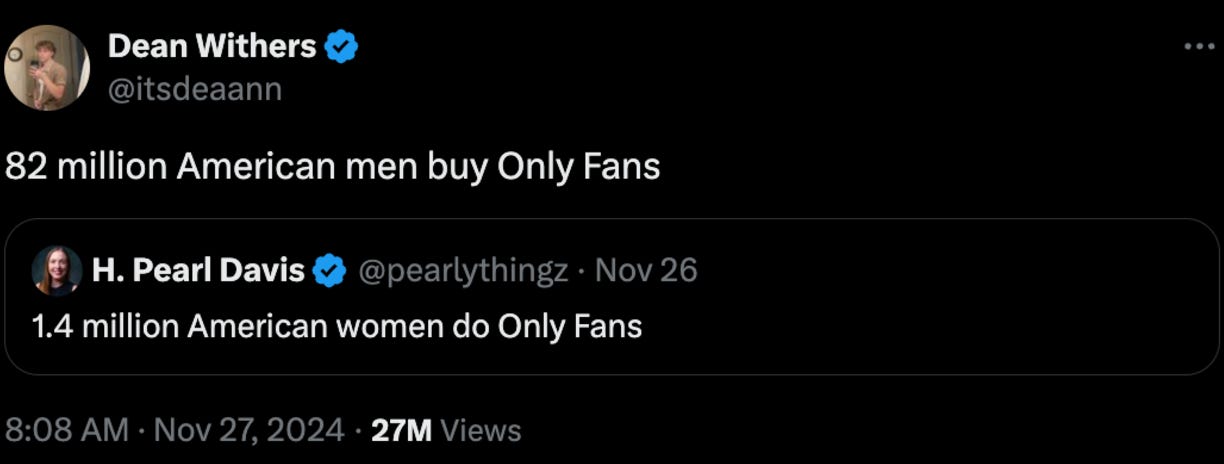
If you’re a woman, you’ve heard the urban legend. A friend of a friend lived happily ever after. But instead of finding her prince charming, she sold feet pics online. Depending on when you heard it, she paid off her student loans, credit card debt, or both.
It’s a seemingly universal female experience of wondering if joining OnlyFans could magically fix all your problems. The female equivalent of all men knowing a guy who invested in Apple right before the iPod came out. Except the stock is your own body.
My theory is there are two types of women: those who have thought about OnlyFans and those who haven’t yet.
This doesn’t mean every woman would seriously consider it, but I’d bet most have at least wondered. When I polled my Instagram community, I expected only a small number to admit they’d thought about it. After all, I have a progressive and feminist audience. To my surprise, more than half of them said they had.
I received more than a hundred responses of women confessing that they had done it for a few months to pay off bills. One even looked into selling their leftover breast milk to “weirdos on the internet” to help make ends meet when she had her second child.
That female curiosity is driven by stories like Sophie Rain’s, a creator who reportedly made $43 million in her first year on OnlyFans—more than most professional athletes. Tales like hers, combined with financial pressures, leave many women wondering if setting up a tripod and posting a few pictures could be a faster route to stability than trying to find a job. After all, today’s economy is precarious, and women are 35% more likely to live in poverty compared to men.
The main reason women join OnlyFans is the same reason people take any job: money. The platform offers immediate income, financial independence, and flexibility. Unlike traditional sex work, it’s safer and easier to start. OnlyFans has minimal overhead, and creators have complete control over their content.
While 70% of the platform features sexually explicit material, OnlyFans has also become a space for safe-for-work (SFW) content. Creators post behind-the-scenes footage, gaming, and fashion blogging. There’s even a standup comedy program.
Though the average creator earns around $2,000 a year, top earners make millions per month. Success depends on consistent posting, audience engagement, and building relationships with fans—like any other content-driven platform.
The platform’s growth numbers are the dream of any social media company. Last year alone, with nothing but 42 employees, OnlyFans added 66 million new users and nearly a million creators. Interestingly, the number of creators has grown faster than fans, with a 29% increase in creators compared to a 27.7% rise in fans.
This surge highlights the platform’s accessibility and its role as a financial lifeline, particularly during the pandemic when women bore the brunt of job losses. The platform’s success has even drawn unexpected creators, like singer Kate Nash, who recently revealed she joined to fund her tours in an increasingly challenging economy for musicians.
Defending her decision, she said, “Don’t be ‘sad’ that I started an OnlyFans to fund my tours. It’s very empowering, and selling pics of my arse is fun and funny. Sex is fun and funny. Women being in control of their bodies is vital and something we should all be standing by and fighting for.”
Yet whenever OnlyFans success stories make the news, they’re often met with sneers from those who look down on women in sex work. You can read Nash’s comments to see the mixed reaction she got joining the site. Or take this tweet by Hannah Pearl Davis, a YouTuber and professional male approval seeker.

These critics, however, rarely address the obvious: OnlyFans exists because men are paying for it. While many women consume the content, the vast majority—69% of paying users—are male. And yet, the shame disproportionately falls on the women creating it, not the men funding it. Ironically, even the company itself owes its existence to a man. Tim Stokely founded OnlyFans in 2016 with a £10,000 loan from his father. Male bonding at its finest!

The shame doesn’t belong to female creators or their male fans. Many women choose this work, but for others, OnlyFans has become a last resort in a system that continues to fail them. And let’s not forget, plenty of men are happily enjoying the results. Many creators cite money problems and the need to support their children as reasons for joining.
The platform’s boom during the pandemic, a time when women’s jobs were disproportionally affected, says it all. The number of month-by-month creators on OnlyFans surged by 75% in April 2020, just as female workers lost 13.5 million jobs—1.5 million more than men.
While the economy has started to recover, that recovery has been slower for women, especially women of color. In an unstable gig economy that’s particularly unforgiving to women, OnlyFans became one of the few options offering both immediate financial relief and some autonomy.
And besides, if conservatives are so upset about women being on OnlyFans, perhaps they should stop blocking the passing of policies like paid leave, affordable childcare, and universal healthcare. These are policies that could offer women more stable futures.
Instead of shaming women for adapting to difficult circumstances, maybe it’s time to consider how their actions create the conditions that push women into nontraditional professions.
And despite its massive user and creator base, the societal conversation around OnlyFans creators lacks the empathy shown to other professions. Consider this: roughly 1.47 million women create content on OnlyFans, compared to 38,700 coal miners in the U.S.
Yet coal miners receive far more attention and support for their working conditions. Both professions rely on physical labor, but only one is considered noble. Work aligned with traditional masculinity is celebrated, while work led by women that forces men to confront their own demons is stigmatized.
While OnlyFans is often framed as a sign of societal decline, it actually makes society safer. By eliminating the need for physical proximity, it reduces risks and increases safety for creators.
Economist Manisha Shah, whom I interviewed while I was at Vox, explained that decriminalizing sex work makes it significantly safer, reducing instances of physical violence and sexually transmitted infections by 58% in contexts compared to where sex work is criminalized. Her findings highlight the importance of supporting platforms like OnlyFans rather than condemning them.
Of course, suggesting that OnlyFans has created zero harm would be unreasonable. Many creators have been doxxed, stalked, and harassed—sometimes in their own homes. One subscriber allegedly hid in a creator’s attic and took photos of her while she slept. And then there’s Andrew Tate, accused of coercing women into creating accounts and taking half their earnings.
Romanian prosecutors allege he used the “loverboy” method to manipulate women into producing explicit content. But let’s be honest: this isn’t just a platform problem—it’s a man problem. Even with all the protections in the world put in place, OnlyFans can’t shield women from the fact that men exist.
It’s simple. OnlyFans is part of our world because men are willing to pay for it, and it becomes dangerous because of how some men choose to use it. Frustratingly, it’s women who are scrutinized, while men’s behavior remains largely unexamined.
The safety and well-being of creators have less to do with women’s choices and more to do with men’s actions. These actions existed long before OnlyFans and will persist even if it’s banned under a Republican Congress.
That outcome has become increasingly probable. Shutting down platforms like OnlyFans is part of the Project 2025 agenda—a plan Trump publicly disavowed before packing his administration with its architects.
OnlyFans is more than just a platform—it’s a mirror reflecting our values and contradictions. It offers women autonomy and financial empowerment, yet its very existence highlights how difficult the economy is for them. It bothers people because it highlights all of our unresolved crap. There’s no easy solution to all of this, but I know that shaming women won’t get us there quicker.
If critics have such a problem with so many young men using OnlyFans, they should take up their issues with those men, not the women carving out a living in the spaces they created.




